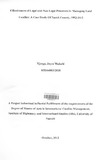| dc.description.abstract | The main purpose of the study was to examine effectiveness of legal and non-legal process in managing land conflict in Narok County, examines who have suffers from such conflicts, and measure the impacts of land conflicts on farm iaput application in Kenya. The function of legal process is to establish' rules and procedures that constrain the power of all parties, hold all parties accountable for their actions, and prohibit the accumulation of autocratic or oligarchic power. Conflict in Narok is rooted in ongoing land issues and the escalation of small-scale tensions through the spread of rumors. Data was mainly be derived from secondary and primary sources. The data collection tools for the secondary data that were in-depth information gathering, and document analysis. The
study concludes that legal systems lack the capacity to build long lasting consensus between parties involved in land conflicts in Narok County. Unlike legal systems, the non- legal systems such as mediation allows for capacity-building workshops, sensitization and listening forum. The study concludes that mediation-based solutions to land disputes contribute to durable individual solutions. Mediation and CBWs have important social, emotional and institutional impacts, directly contributing to local conflict management capacity and a mediation culture. | en_US |

